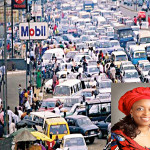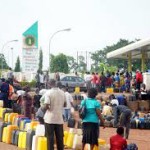Ki i ṣe àkọ́kọ́ ti ọ̀wọ́n epo ọkọ̀ yio wáyé ni Nigeria, ṣùgbọ́n bi ijiyà ti ọ̀wọ́n epo ọkọ̀ kó bá ará ilú bá ti tán, Ìjọba àti ará ilú á gbàgbé ni wéré, wọn ki kọ́ ọgbọ́n lati ronú ohun ti wọn lè ṣe lati jẹ ki irú rẹ ma wáyé mọ.
Epo ọkọ̀ kò kọ́kọ́ wọ́n nigbati Olóri-ogun Abacha gba Ìjọba ni ọdún mejilélógún sẹhin, ṣùgbọ́n lati bi ogún ọdún, epo ọkọ̀ bẹ̀rẹ̀ si wọn ni ilé-epo nitori wọn kò tún ilé iṣẹ́ tó nṣe epo ọkọ̀ ṣe, àbẹ̀tẹ́lẹ̀ gbigbà àti iwà ibàjẹ́ pọ̀ fún àwọn ti o nkó epo ọkọ̀ wọlé lati Òkè-òkun àti ilé-epo. Ijiyà yi pọ gidigidi, nitori ọ̀pọ̀ n sun ilé-epo fún ọ̀sẹ̀ kan nitori àti ri epo ọkọ̀ rà ni oye ti Ìjọba ni ki wọn ta a, ṣùgbọ́n ilé epo gbà lati ta epo fùn alarobọ̀ ju ọlọ́kọ̀ lọ. Nigbati Olóri-ogun Olúṣẹ́gun Ọbásanjọ́ di Olóri-Òṣèlú, ti wọn ri ọ̀rọ̀ ọ̀wọ́n epo ọkọ̀ yanjú, ilú gbàgbé iyà yi. Yàtọ̀ si ki àwọn Ọlọ́kọ̀ epo ọkọ̀ da iṣẹ́ silẹ̀, tàbi ki òṣiṣẹ́ ilé-epo rọ̀bì da iṣẹ́ silẹ̀, ọ̀wọ́n epo ti fẹ́ di ìgbàgbé, nitori irú eleyi ki pẹ́ ju ọjọ́ meji si mẹta lọ.
- Ọlọ́kọ̀ epo ọkọ̀ da iṣẹ́ silẹ̀ – Oil Workers strike. Courtesy: Google images
- Ọ̀wọ́n epo ọkọ̀ ní Nigeria – 2015 Fuel Scarcity . Courtesy: Google images
- ọ̀pọ̀ n sun ilé-epo – many slept in the Fuel Station. Courtesy: Google images
Ẹ ṣe iránti, ni oṣù kini ọdún kẹta sẹhin, nitori wọn fẹ fi owó kún epo ọkọ̀ lójú ẹ̀rọ, epo ọkọ̀ wọ́n, ṣùgbọ́n bi ilú fẹ́ bi ó kọ̀, Ìjọba Goodluck Ebele Jonathan fi owó kún epo ọkọ̀ lati Naira marunlelọgọta di Naira mẹtadinlọgọrun. Ni àsìkò yi, gbogbo èrò bọ́ sita lati sọ tinú wọn pé kò si ohun ti ó yẹ ki wọn gbé epo rọ̀bi lati Nigeria lọ si Òkè-Òkun lati lọ sọ di epo ọkọ̀, ki wọn tún fi owó ko padà silé pẹ̀lú owó iyebiye nigbati wọn lè tún ilé-iṣẹ́ to nṣe epo ọkọ̀ ṣe àti lati kọ́ tuntun si. Ìjọba ṣe ìlérí fún ará ilú pé àwọn yio lo owó ti wọn bá ri fi tún ohun amáyédẹrùn igbàlódé ṣe, wọn o si kọ àti tún ilé-iṣẹ́ ti o nsọ epo rọ̀bì di epo ọkọ̀ ṣe. Ọdún mẹta ti kọjá, Ìjọba kò mú ìlérí yi ṣẹ nitori àbẹ̀tẹ́lẹ̀ gbigbà àti iwà ibàjẹ́.
Nigeria wà ni ipò kejila ninú ọrọ̀ ajé epo rọ̀bì ti tà ni àgbáyé. Owó epo rọ̀bì mú irọ̀rùn bá ilú nitori lára owó rẹ ni wọn pin fún Òṣìṣé Ìjọba ni ọdún mọkanlelogoji sẹhin (eyi ti a mọ̀ si owó Udoji), wọn fi tún ilú ṣe àti pèsè ohun amáyédẹrùn igbàlódé fún ilú. Owó epo rọ̀bì ni orilẹ èdè fi ja ogun abẹ́lé lai jẹ igbèsè, wọn fi kọ́ ile ise ti o nso epo rọ̀bì di epo ọkọ̀ àti epo ìdáná, bẹni wọn pin fún gbogbo ẹ̀yà Nigeria fun ìdàgbàsókè. Ìfẹ́ owó lai fẹ́ ṣiṣẹ́ nitori owó epo rọ̀bì bẹ̀rẹ̀ si ba ilú jẹ́. Gbogbo ará ilú bẹ̀rẹ̀ si gbójúlé owó epo rọ̀bì ju iṣẹ́ àgbẹ̀ tàbi ṣe iṣẹ́ míràn lati kó ọrọ̀ jọ.
Yorùbá ni “Ọ̀mùtín gbàgbé ìṣẹ̀”, ará ilú Nigeria ki pẹ́ gbàgbé ìṣẹ́, eyi ló njẹ́ ki Òṣèlú ṣe bi wọn ti fẹ́. Lẹhin ọdún mẹrindinlógún ẹgbẹ́ Alágboòrùn, a lérò wi pé ará ilú yio fún ẹgbẹ́ Onigbalẹ̀ ti ó mbọ̀ ni àyè lati tún ilé-iṣẹ́ ti o nsọ epo rọ̀bì di epo ọkọ̀ ṣe, ki wọn kọ́ tuntun si, din àbẹ̀tẹ́lẹ̀ gbigbà àti iwà ibàjẹ́ ku.
ENGLISH TRANSLATION
This is not the first time of fuel scarcity in Nigeria, but as soon as the suffering associated with fuel scarcity is over, both the Government and the people forgets so quickly, without learning a lesson in order to finding a permanent solution to prevent future occurrence.
Initially during Abacha’s Regime twenty-two years ago, there was no scarcity, but from twenty years ago, fuel scarcity began to surface as a result of lack of maintenance of the Refineries, bribery and corruption associated with product importation and Oil Marketers. The suffering was so much, because many slept in the Fuel Station for days and weeks to buy fuel at regulated pump price, whereas, the Marketers preferred to sell to Black Marketers. Fuel scarcity problem was abated when Gen. Olusegun Obasanjo became the President and the people forgot about the suffering caused by fuel scarcity. The suffering was almost forgotten except during the occasional Tanker Drivers or Oil Workers strike which often lasted for about two to three days.
Recalling that three years ago (2012) during fuel subsidy removal episode, there was scarcity, in spite of people’s protest, the Jonathan administration removed the subsidy from Sixty-five Naira to Ninety-seven Naira. There was mass protest to reject such increase because it is believed Nigeria has no excuse carrying crude oil to be refined abroad and importing same at a huge cost, when the Refineries can be upgraded and also build new ones. The Government then promised that the proceeds of the subsidy removal will be dedicated for the purpose of improving modern infrastructure, maintain and build new Refineries. Three years has passed, promises were not kept because of bribery and corruption in the Oil Industry.
Nigeria is number twelve among the Oil Producing Countries in the World. Crude Oil proceeds brought comfort to her people because forty-one years ago, it was used to pay huge increase to Government Employees (known as Udoji), and it was used to provide modern infrastructure. Crude Oil proceed was also used during the Civil War without external borrowing, build Refineries and also allocated to the States created for their development. Love of easy money without the desire to work for it as a result of over dependent on Crude Oil sale is affecting the Country. Farming and the other sources of wealth were neglected for Crude Oil revenue.
Yoruba adage said “Drunkards forget their sorrow”, Nigerians forget suffering so easily, this has made the subsequent Leaders or Politicians take the people for granted. After sixteen years of Peoples’ Democratic Party (PDP outgoing Party), it is hoped that the incoming All Progressive Party (APC) will be given time to seek for permanent solution by maintaining and building new Refineries and also reduce bribery and corruption drastically.





